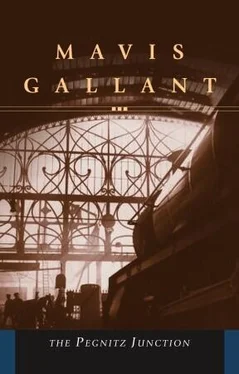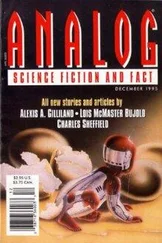Sigi left Marie still pensive, still occupied with her bread-crust. He walked with his hand in his mother’s. His mother said, “Did the Marie ask you any questions?” But Marie hardly ever spoke. His mother said that minding geese was too big a job for a little child; a long prison sentence was the punishment now for misappropriation of domestic fowl.
He was prepared for the end, perhaps the end of everything living, and he knew that endings were in blood. He decided to take to his execution Peoples of the World , a schoolprize of his father’s, which was in perfect condition; his father never smudged or creased anything he owned and washed his hands before taking down a book. In this book were the Ancient Egyptians looking with one eye at a time precisely like Marie’s geese. He closed his eyes so that his last memory would be of Marie.
“Why are you walking with your eyes shut?” asked his mother.
“I’m pretending to be blind.”
“God will strike you blind if you play such wicked games.” Normally she would have gone on to say exactly why God would want to do a thing like that. Her abrupt silence was part of the end of everything.
When she woke him up that night and dressed him (he could dress himself) she was still tongue-tied, and when he asked something she put her hand on his mouth.
“Tape it?” said his father, of Sigi’s mouth. She shook her head. “God help us if you don’t keep it shut, Sigi,” said his father, bringing Him into it again. After he was dressed they gave him a glass of milk and told him to drink all of it. But they could not wait for him to finish drinking and when he was only halfway through his father removed the glass. His parents wore heavy coats and carried knapsacks. Sigi took Peoples of the World from under his pillow.
“No, you will need both hands,” his father said. He pinched Sigi’s arm, like the witch testing Hansel, and asked, “Will he be warm enough?”
The signs of the end of the world were being dressed in the night, the milky glass left on the table, and his mother’s silence. She did not even ask why he had taken Peoples of the World to bed. Much later he fell asleep again. His father was carrying him, and woke him suddenly by setting him on his feet in a ploughed field. Unable to move, paralyzed, he heard a strange man cursing him, and suddenly his mother cried from another corner of darkness, “Run!” So he plunged at a crouch between ropes of barbed wire as if he had been trained for this all his life. The man cursing him for his slowness grabbed Sigi and dragged him face down. He looked up to see who it was and left a piece of his scalp on a wire. No matter how he combed his hair ever after the scar reappeared.
They went to live in Essen. He hated the food, school, traffic, accents, streets. No grass, no air to breathe. He would say to himself, “When I turn this corner, Marie will be here.” Years later somebody sent a long letter with news of the village. Part of it was, “As for the Marie, she is so fat and stupid she falls off her bicycle.”
“Some of them have bicycles,” was all Sigi’s father gleaned from this important letter.
His mother had kept a newspaper account of their adventure. He knew there had been just the three of them besides the unseen man who had cursed him, but the paper said they had been thirty-seven, the technical staff of the small lens factory and their wives and children.
He walked just in front of Christine and little Bert, holding a hand to his head because of the scar — a bad habit. He suddenly turned and came back so that they seemed to be walking towards a meeting point. She saw that he knew she knew everything; the expression on his face was one of infinite sorrow.
What are you doing here? she tried to ask as they nearly met. Why spend a vacation in a dead landscape? Why aren’t you with all those others in Majorca and Bulgaria? Why bother to look? The houses are shuttered on one side. No one sees you except a policeman with field glasses. Marie wouldn’t look even if she remembered you. Wouldn’t, couldn’t — she has forgotten how. Her face turns the other way now. Decide what the rest of your life is to be. Whatever you are now you might be forever, give or take a few conversions and lapses from faith. Besides, she said, as they silently passed each other, you know this was not the place. It must have been to the north.
Herbert had never seen such a hideous station or such a squalid town — so he said now, catching up to them. Prussian taste, he said, and all Napoleon’s fault. By what right did Napoleon turn us over to the Prussians, he wanted to know? En quel honneur? He sounded as though he might write a letter to the newspapers complaining about Napoleon. He had discovered something curious, he went on: a coffeehouse on stilts. Part of its attraction, other than a trio of musicians (fiddle, accordion, xylophone) was the view it afforded of the ditches and mantraps over there. From the coffeehouse veranda you could even see a man in uniform looking through field glasses. “You don’t see that often,” said Herbert, but he meant the orchestra. He continued in French, for he did not want little Bert to hear: the veranda on stilts was full of guest workers talking Turkish, Croatian and North African dialects. Though needed for the economy, the guest workers had brought with them new strains of tuberculosis, syphilis, and amebic complaints that resisted antibiotics. Everyone knew this, but the government was hushing it up. Herbert had proof, in fact, but he would not make it public, for he did not wish to favour the opposition. But here was what he was getting at — Herbert did not want little Bert, young and vulnerable, to drink out of the same glasses as foreign disease-bearers. On the other hand, he must not breathe the slightest whiff of racial animosity. Therefore would Christine please engage the child’s attention until they had passed the coffeehouse?
They were moving back slowly, she holding little Bert’s hand, and he not fretting to be nearer his father, quite happy with her. Presently they found they were four abreast with the scarred stranger, all walking at the same pace. It would have seemed awkward to have drawn back or hurried ahead. Just as, shyly silent, they came level with the coffeehouse, the stranger spoke up: “That place is always packed with foreigners.”
“What place?” said little Bert at once.
“Do you object to them?” said Herbert, in his most pleasant tone of voice.
“I don’t know much about them. I never travel. My father was in Montenegro. The partisans gave him a bad time. I think I wasn’t born yet. I’m not sure of the year. Forty-three?”
“I hope they gave him a bad time,” said Herbert, who always said such things with a smile. People who did not know him had to think again, wondering what they had heard. No one knew how to deal with Herbert’s ambiguities. “I hope they gave him a very bad time.”
Could I have heard this? the scarred man seemed to appeal to Christine.
Suit yourself, she seemed to answer. I wasn’t born either.
“Now the children of the partisans come here as guest workers,” said Herbert, still smiling. “And we all drink coffee together. What could be better?”
The stranger edged away, went over to an old man standing by himself on the station platform and began to speak urgently in a low voice. The old man came up to his shoulder. He had not a tooth in his mouth, not a hair on his head, and was about the age and the size of the night porter in their Paris hotel. He was dressed in clean tennis shoes without laces, old army trousers, and a worn regional jacket over an open shirt. He rocked heel to toe as he listened, then said loudly to whatever it was the scarred man had asked, “I wouldn’t know. I don’t know any names around here. I’m a refugee too.”
Читать дальше












